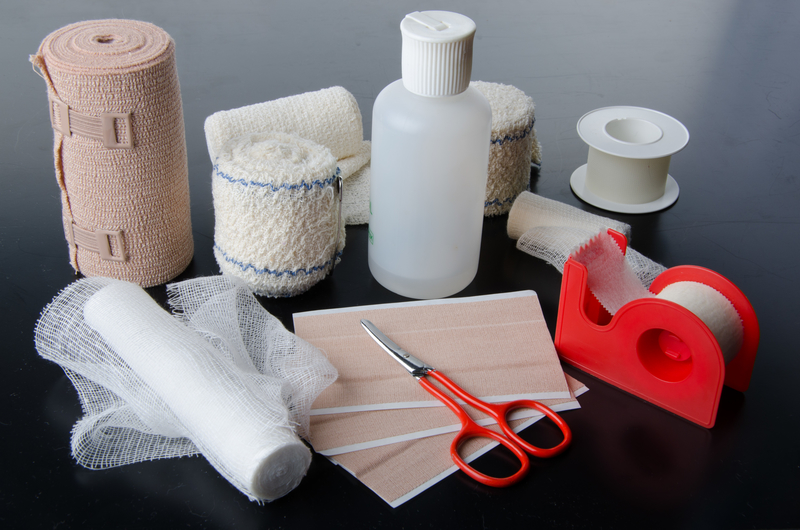When you make the list of necessary medical supplies to stockpile, you should consider factors such as budget, family needs, and family health history. If one of your family members requires special treatments not on this list (i.e. Epipen or asthma inhaler), be sure add it to the list.
Ready to start the list? Read on.
1. Needles and scalpels
Along with these, you’ll need the knowledge to use them properly. Training is necessary to use these items, and DO NOT USE this stuff if you don’t know how to do so, ever! However, if a medical professional is able to provide assistance, they will be invaluable.
2. Antibiotics
These will be a must-have in any post-collapse scenario! Check out this article for more details about how to stock up on antibiotics and which to buy.
3. Reference Materials
Merck Manual, JP Sanford (antibiotic guide), Tarascon’s Pharmacopea (Rx index), CPR & Cardiac Care guides, etc.
4. Medical skills and ability
Acquire and practice knowledge, concentration, control, stamina, will, training, and expertise. By all means, take a First Aid and CPR class, but don’t stop there. Wilderness Survival classes are offered at REI stores and some community colleges offer classes for EMT students. Red Cross offers a lot more than just basic First Aid and CPR.
5. Fluids
Pedialyte is best, not Gatorade! You can also mix up your own with this recipe.
6. A secure treatment area
Being able to attend to urgent medical needs in a secure area is something you may not have thought of. In addition to the presence of hysterical family members and friends whose loved ones’ lives are in jeopardy, there could be additional threats from outsiders. Take some time to plan where your makeshift treatment/triage area should be located.
7. Emotional Stress Treatment
Have on hand extra meds you and family members are already taking. If you run out of special meds that treat acute episodes, it will definitely be a time to panic!
8. Organic (not synthetic) Natural Multi-B Vitamins
9. Comfort items
These may not have to do with “medical care” at all. Think of things like candy, DVD’s, animals in our care that we love, protective and security items
10. Penrose Drain Tubes
These can be used as tourniquets or drains, etc.
Good health and access to emergency medical care is something we take for granted, but anyone of us could be one disaster away from a life-and-death situation. To learn more about the medical supplies you need, check out Survivalist Mom.

1. Needles and scalpels
Along with these, you’ll need the knowledge to use them properly. Training is necessary to use these items, and DO NOT USE this stuff if you don’t know how to do so, ever! However, if a medical professional is able to provide assistance, they will be invaluable.
2. Antibiotics
These will be a must-have in any post-collapse scenario! Check out this article for more details about how to stock up on antibiotics and which to buy.
3. Reference Materials
Merck Manual, JP Sanford (antibiotic guide), Tarascon’s Pharmacopea (Rx index), CPR & Cardiac Care guides, etc.
4. Medical skills and ability
Acquire and practice knowledge, concentration, control, stamina, will, training, and expertise. By all means, take a First Aid and CPR class, but don’t stop there. Wilderness Survival classes are offered at REI stores and some community colleges offer classes for EMT students. Red Cross offers a lot more than just basic First Aid and CPR.
5. Fluids
Pedialyte is best, not Gatorade! You can also mix up your own with this recipe.
6. A secure treatment area
Being able to attend to urgent medical needs in a secure area is something you may not have thought of. In addition to the presence of hysterical family members and friends whose loved ones’ lives are in jeopardy, there could be additional threats from outsiders. Take some time to plan where your makeshift treatment/triage area should be located.
7. Emotional Stress Treatment
Have on hand extra meds you and family members are already taking. If you run out of special meds that treat acute episodes, it will definitely be a time to panic!
8. Organic (not synthetic) Natural Multi-B Vitamins
9. Comfort items
These may not have to do with “medical care” at all. Think of things like candy, DVD’s, animals in our care that we love, protective and security items
10. Penrose Drain Tubes
These can be used as tourniquets or drains, etc
#savedyouaclick
Matty Compton